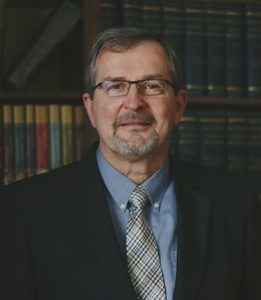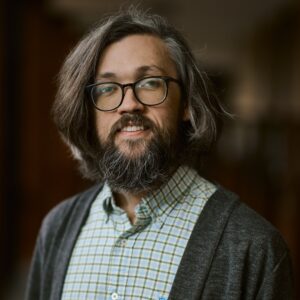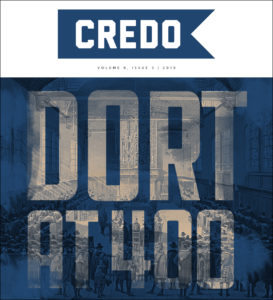Joel Beeke has spent his life championing the reformed theology of the Puritans. He’s helped hundreds develop a love for theology as a prolific author, seminary founder and president, and pastor. He agreed to join us at Credo to discuss Dort, the Puritans, and even a bit about Charles Spurgeon. His insight was as rich as we have come to expect.
Joel, you’ve dedicated your life to the contemporary renaissance of Puritan theology. You could have picked the patristics or the Reformers. So why the Puritans and why now?
In part, my focus on the Puritans arises from personal experience. As a teenager I took books by Thomas Goodwin off my father’s shelves and read them. Since then, I have never read anything outside of the Holy Scriptures that so strengthens my soul. The more I read the Puritans, the more I am convinced that God the Holy Spirit worked through them with unprecedented clarity and power to bring biblical reformation and revival.
As you look at the church today, in what ways do the Puritans “live on”?
In a general sense, the Puritans live on wherever biblical Christianity flourishes, for they were simply an example of Christians seeking to live by God’s Word. More specifically, the heirs of the Puritans may be found among Christians who embrace both fidelity to the great doctrines of the Reformed confessions and the experiential spirituality they entail.
You’ve said that the Puritans have specifically spurred you onto holiness more than any other writers. Many Christians echo your experience. What is it about the Puritans that sparks this drive for sanctification?
This question deserves a whole book for an answer, but I’ll highlight two factors. First, the Puritans understand that true holiness arises from vital union with Christ by the Spirit. Hence, they constantly pointed their hearers (and readers) to the Mediator, which kept their approach to sanctification within the grace of the triune God.
Second, the Puritans were eminently practical and realistic. Their view of sanctification did not entail removing yourself from ordinary human life (though it did require separation from worldliness and sin), but instead showed how to bring holiness into the heart and home.
I’ve heard that you are always reading at least one Puritan. Which Puritan author or books are you currently working through now?
Presently, I am reading through the complete works of William Perkins in conjunction with Reformation Heritage Books’ 10-volume reprint of his corpus.
Next, will be a 12-volume edition of Samuel Rutherford’s works in the next decade, and perhaps the works of John Cotton as well. I am also reading the writings of Anthony Burgess in my spare time, and would love to publish his completed works as well. In my opinion, he is the Puritan that has been most neglected for no good reason.
Charles Spurgeon is often referred to as the last of the Puritans or the heir of the Puritans. Do you believe that this an accurate description?
Yes and no. From an historical perspective, I would have to say Spurgeon is not a Puritan because the Puritan movement in Britain ran from roughly 1560 to 1720, long before Spurgeon was born in 1834. However, the great English preacher could be counted an heir of the Puritans in that he proclaimed the same Reformed doctrines as the Puritans (flavored, of course, with his Baptist ecclesiology), read and quoted the Puritans frequently, and called people to the same God-centered piety that the Puritans promoted.
This issue of Credo Magazine celebrates the 400th anniversary of the Synod of Dort. As you revisit the canons of Dort, is there one in particular that brings you great comfort and assurance?
Head V, which deals with the relationship between the doctrines of perseverance and assurance in a masterful and comforting way, is my favorite part of the Canons of Dort. I have recently written a few articles about its comfort.
You have pastored a number of churches and have even referred to the pastorate as your first calling. But you are also a seminary president. How does your experience pastoring the local church benefit you in the academy and vice versa?
As a professor of systematic theology and homiletics, it helps me immensely to have significant experience in pastoral ministry, for it constantly reminds me that theology and sermons exist to serve real people in real life. We do not do academics for the sake of academics, but to serve the church. Vice versa, my doctoral studies and subsequent involvement in teaching theology have greatly enriched my pastoral ministry, both by increasing my understanding of divine truth and by expanding my exposure to the broader Reformed tradition outside of my particular denomination.
You helped establish Puritan Reformed Theological Seminary in 1994 and have served as the institution’s only president. What was the chief motivation in starting this school?
Our mission at PRTS is to prepare students to serve Christ and His church through biblical, experiential, and practical ministry. We train our students according to the Scriptures and the historic Reformed confessions. Back in 1994, we were motivated to begin the seminary to meet the needs of our fledgling denomination, but from its commencement, we had a worldwide, international vision for the work. We just never dreamed that it would grow and expand as rapidly as it did.
Last year we had the privilege of serving 224 students in our accredited MA, MDiv, ThM, and PhD programs. The students hailed from twenty countries and thirty-two denominations. By God’s grace, I have been greatly blessed by God surrounding me with excellent faculty and staff, and sending us excellent students from every inhabited continent on the globe.
You have written, “There is no true theology without Bible study, and no faithful Bible study without theological reflection.” How should lay Christians think about the relationship between theology and their regular devotional reading of Scripture?
Theology need not be a highly intellectual activity; we do theology whenever we think or speak about God and His ways. Therefore, the most important relationship between theology and devotions is that Christians should read their Bibles to know God in a vital and powerful way through Jesus Christ.
Devotional reading can degenerate in several directions, including a legalistic approach that makes one’s “quiet time” into a kind of righteousness before God and a mystical approach that seeks little more than an emotional uplift. We must read the Bible remembering that God Himself is speaking to us, and the greatest reason why He speaks is so that we can know Him. We must read the Bible remembering that God Himself is speaking to us, and the greatest reason why He speaks is so that we can know Him. Click To Tweet
Another theological aspect of devotional reading is the need to think about how the meaning of one Scripture passage connects with others that address the same topic. God’s Word aims to form in us a comprehensive wisdom for life—not just isolated texts that we can quote for our personal comfort. This systematic approach to the Bible is crucial to grow in the fear of the Lord.
Are you encouraged by the resurgence of Reformed theology today among young pastors? What are some potential pitfalls to avoid as pastors teach their congregations Reformed doctrine?
I am encouraged, for the most part, by the Reformed “resurgence.” The doctrines of grace are not naturally appealing to us, so I am grateful to God for the Holy Spirit’s work to advance the truth in the church. As to pastoral pitfalls, let me mention three.
First, beware of advocating Reformed doctrine without living Reformed piety. Augustine said that the three essentials (not five points!) of Christianity are humility, humility, and humility. Christlike love and humility will manifest themselves in gentleness and patience toward those who oppose the truth.
Second, never try to convince people of Reformed doctrine by mere logic and many quotations of great theologians. That would be a denial of sola Scriptura (Scripture alone is the divine rule of faith). Instead, teach the Bible to people and pray without ceasing for their illumination. Logic and historical theology are servants to God’s Word, not the other way around.
Third, it is a mistake to isolate some aspects of Reformed doctrine from the whole perspective of the Reformed heritage that subsumes all of life under the divine authority of Scripture alone for the glory of God alone. For example, the biblical doctrine of election will not prosper in the long term without the practice of the biblical doctrines of worship and evangelism.




